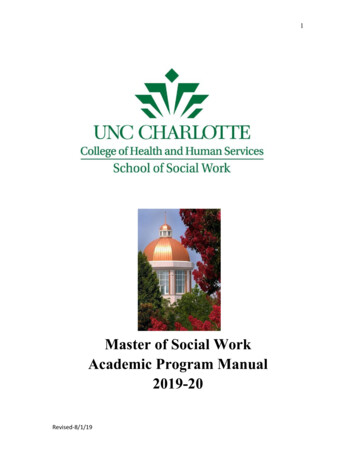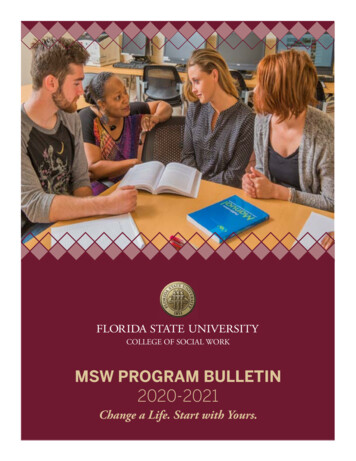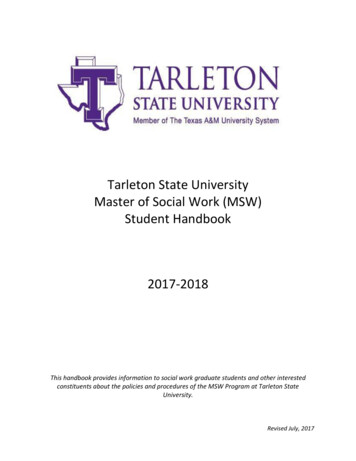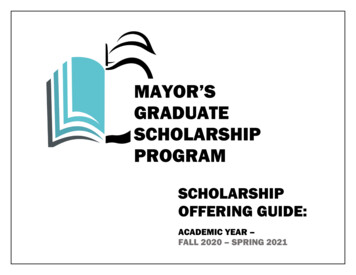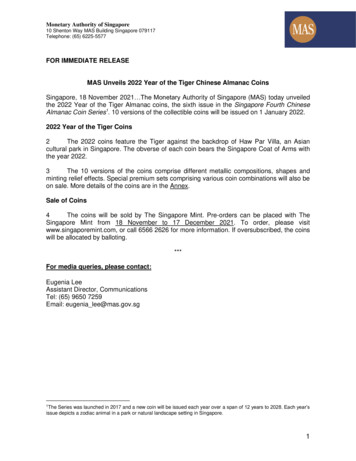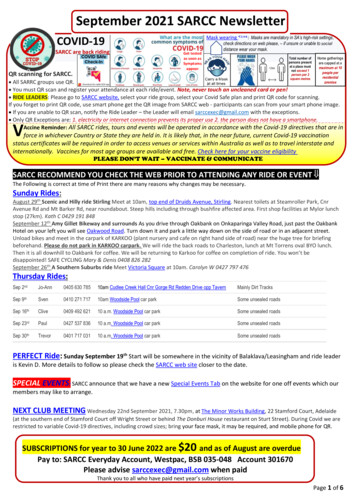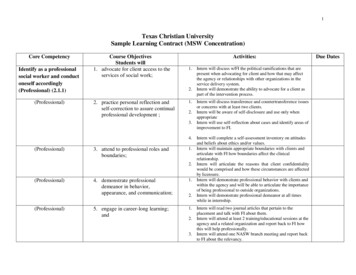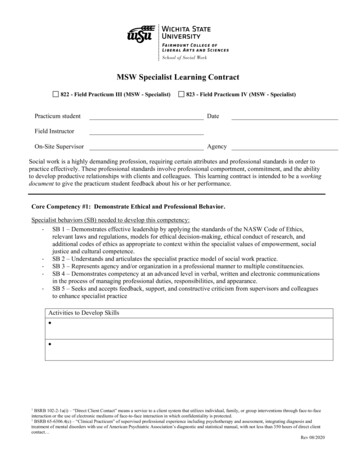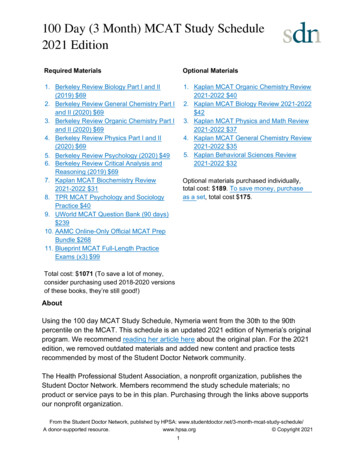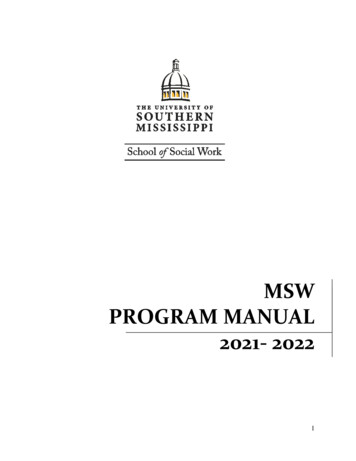
Transcription
MSWPROGRAM MANUAL2021- 20221
THE UNIVERSITY OF SOUTHERN MISSISSIPPISCHOOL OF SOCIAL WORK118 College Drive #5114Hattiesburg, Mississippi 39406Telephone: (601) 266-4163FAX: (601) 266-4167AdministrationTrent Gould, Dean, College of Education and Human SciencesJerome Kolbo, Director, School of Social WorkSchool of Social Work Web Address:http://www.usm.edu/social-workThis manual is for information purposes only and is not an official publication of The Universityof Southern Mississippi. For official rules and regulations, please refer to the bulletins which canbe obtained from the Registrar, http://www.usm.edu/registrar.2
PURPOSE OF THIS MANUALThe purpose of this manual is to describe the structures, goals and expectations, the roles andresponsibilities, and the policies and procedures that form the basis for, and guide the MSWProgram. It was prepared by faculty and students for YOU. The handbook contains informationabout the MSW Program, the curriculum, admission to and progression through the programand students’ rights and responsibilities. Please refer to it whenever you have questions aboutthe program.3
TABLE OF CONTENTSHistory . 7Mission . 8College of Education and Human SciencesSchool of Social WorkGoals and objectivesAccreditation Statement . 8Administrative structure of the School . 8Students Rights and Privileges . 9Nondiscrimination policyAmericans with Disabilities ActSafeguarding of Records (FERPA)Sexual HarassmentSocial Issues and Policies . 10STRIDE StatementSubstance AbuseSmokingAdvisement. 12Curriculum Design . 12Generalist and Area of Specialization (Resilience Informed Social Work Practice)No ElectivesNo Credit for Life ExperienceCurriculum Requirements . 16Credit Hour Requirement for the MSW DegreeFull-Time Curriculum ModelPart-Time Curriculum ModelAdvanced Standing Full-Time Curriculum ModelAdvanced Standing Part-Time Curriculum ModelAdmissions . 20Admissions StandardsApplication DeadlinesConditional AdmissionQualifying ExamNon-Degree Seeking Graduate StudentsTransfer of CreditsTk20Academic Regulations and Policies. 25Progression PoliciesCourse WithdrawalIncomplete Grades4
Non-Duplication of Content Mastered in BSW programsTape/Digital RecordingAuditing a CourseIndependent StudyGrade Appeal ProcessAcademic IntegrityElectronic DevicesChildren in the ClassroomGuests in the ClassroomCriminal Background CheckConfidentiality and Mandated ReportingClass Attendance PolicyPregnancy-Related AccommodationsMilitary ServicePolicy Exemption RequestsEthical and Professional BehaviorFaculty ConcernsStudent Performance Committee (SPC)Termination PolicyPolicy for Terminating Enrollment in the Social Work ProgramAcademic Performance Which May Constitute Termination in the BSW ProgramCommunication .33EmailTextingBulletin BoardsFacebook/Social MediaInternet AccessLetters of ReferenceChange of Address/Phone NumbersStudent Recognition .34AwardsEnd of Year CelebrationHonorsGraduation .35When to Apply/Application for DegreeCommencement InformationHooding CeremonyProfessional Licensure .35Mississippi BoardNational Licensure Exam (ASWB)Student Participation on School Committees .36Composition of School CommitteesStudent Organizations and Professional Affiliations . 37National Association of Social Workers (NASW)SASW (Student Association of Social Work)5
Golden Eagles Inter-Tribal SocietyCenter for Human RightsSTRIDE TeamPhi Alpha Honor SocietyUniversity Services and Academic Support Programs . 38Student Support ServicesThe Writing/Speaking CenterOffice of Disability AccommodationsStudent Health ServicesCARES (Campus Action Referral and Evaluation System)Counseling CenterCareer and Student Employment ServicesLibrariesBookstoreMental Well-BeingFinancial Aid/Scholarships . 38Employment Opportunities . 39AppendicesA. Foundation Competencies/Practice Behaviors . 40B. Social Work Professional and Technical Standards . 49C. Professional Expectations for Social Work Students. 55D. NASW Code of Ethics . 57E. Pregnancy-Related Accommodations .78F. Military Service Accommodations . .796
HISTORY OF THE GRADUATE SOCIAL WORK PROGRAMThe School of Social Work at The University of Southern Mississippi has a long history. Socialwork courses were included in the curriculum of the Department of Sociology and Anthropologysince 1960. At that time, students were allowed to major in sociology with an emphasis in socialwork. There were three social work courses at that time: Introduction to Social Work, Methods ofSocial Work, and Field Work Practicum.During the late 1960’s there was growing national attention on the importance of social worklicensure and social work education. There was also a growing awareness nationwide that a socialwork emphasis in a sociology program was not adequate to address the complex problemsindividuals, communities and societies may need to have addressed. At this same time locally,there was a growing movement, spearheaded by the National Association of Social Workers –Mississippi Chapter to establish an autonomous School of Social Work, separate from theacademic disciplines of sociology and anthropology. In 1973, the Board of Trustees of Institutionsof Higher Learning in the State of Mississippi established the first graduate school of social workin the State of Mississippi, at The University of Southern Mississippi.The School of Social Work received initial accreditation from the Commission on Accreditation,Council on Social Work Education in 1976. In June, 1979, the School’s accreditation wasreaffirmed after a mandatory review. The graduate social work program at The University ofSouthern Mississippi has been continuously accredited since that time. The School of Social Worknow offers Full-Time, Part-Time, and Advanced Standing graduate programs on the Hattiesburgand Gulf Coast campuses.VISION & MISSION - COLLEGE OF EDUCATION AND H UMAN SCIENCESVision: By capitalizing on its unique academic composition and commitment to excellence, theCollege of Education and Human Sciences will be the primary choice for regional, national, andinternational undergraduate and graduate students that meet high standards for admission andgraduation in each of our programs. Our academic programs will recruit, retain, and graduatestudents representing diverse groups and at rates that represent the top quartilenationally. Academic programs in the College of Education and Human Sciences will providetransformative educational experiences to ensure that graduates possess the necessary knowledge,skills, and professional dispositions to be successful and to positively influence a culturallydiverse, global community.Mission: Building on the distinctive heritage of our university as a normal college, the College ofEducation and Human Sciences has expanded its mission to prepare not only successfulprofessional educators but also influential researchers, mental health and human serviceprofessionals, and information specialists. The College 1) delivers high quality teaching thattransforms the lives of students, 2) generates and disseminates knowledge through research thatimpacts societal needs, and 3) engages in professional service that multiplies the effects of bothteaching and research. The College of Education and Human Sciences provides a studentexperience characterized by student support that fosters success, provides exposure to diversity ofpeople and ideas, includes active engagement in research, offers quality practicum and internshipexperiences, and provides opportunities for professional service.7
MISSION OF THE SCHOOL OF SOCIAL WORKThe USM School of Social Work develops and communicates social work knowledge and skillsconsistent with the values and ethics of the profession. We are inspired by a vision of social justiceand advocacy for the well-being of all people. Our graduates produce dynamic solutions forpersonal, interpersonal, and systemic challenges with particular attention to the needs of peoplewho are poor, oppressed, and underserved.GOALS AND OBJECTIVES OF THE SCHOOL OF SOCIAL WORKWe prepare students for competent, ethical, and culturally informed social work practice.We deliver a dynamic, integrated competency-based curriculum.We infuse opportunities across the curriculum for students to demonstrate masteryof social work knowledge, skills, and values.We promote a professional social work identity.We advance knowledge relevant to social work practice and social welfare.We engage faculty, staff, and students in research and scholarship.We pursue and secure external funding to support research and program activities.We translate research findings and critical inquiry into scholarly products thatinform practice, policy, and social service delivery.We inspire realization of human potential.We promote healthy human growth and development.We develop dynamic strategies and actions to address oppressive social conditions.We model leadership and advocacy for social change.ACCREDITATION STATEMENTThe Council on Social Work Education (CSWE), a national professional social work educationstandard setting body, sets guidelines and policies which all accredited BSW and MSW programsmust follow in order to attain their status as accredited institutions. The Master of Social Workprogram has been continuously accredited by/CSWE since 1976. The BSW program has beencontinuously accredited by CSWE since 1996. Students are also encouraged to review theEducational Policy and Accreditation Standards for social work degree programs as set forth bythe CSWE. The full text of the CSWE Policies is available at http://www.cswe.org.8
ADMINISTRATIVE STRUCTURE OF THE SCHOOLThe School of Social Work is an autonomous unit within the College of Education and HumanSciences. It is administered by the Director, who was delegated authority for certain educationaland administrative tasks to individuals and committees within the school.The administrative team of the school consists of the Director, an Associate Director, an MSWProgram Coordinator, a BSW Program Coordinator, the Director of Field Instruction and severalstaff.The MSW and BSW Coordinators share in the overall management of the school, with emphasison the MSW and BSW programs.The Coordinator of Field Instruction oversees the operation of field programs by implementingand enforcing field policies. See the field handbook for current field policies and procedures.STUDENTS RIGHTS AND PRIVILEGESNondiscrimination PolicyThe University of Southern Mississippi does not discriminate on the basis of age, sex, sexualorientation, disability, pregnancy, gender identity, genetic information, religion, race, color,national origin, veteran status, or any other status protected under applicable federal, state, or locallaw, in its admission, treatment, or access to its educational programs and activities or in itsemployment practices. The University of Southern Mississippi prohibits sexual and gender-basedharassment, including sexual assault and misconduct, and other forms of interpersonal violence.See pres-aa-005 for full policy.The School of Social Work program's organization and implementation is conducted withoutdiscrimination on the basis of race, color, gender, age, creed, ethnic or national origin, disabilities,political beliefs or sexual orientation. The program faculty are committed to teach, encourage andpromote an appreciation for and understanding of diversity in the School, College, University,community and profession. The school seeks diversity among its faculty, staff and students.ADA PolicyIf a student has a disability that qualifies under the Americans with Disabilities Act (ADA) andrequires accommodations, he/she should contact the Office for Disability Accommodations(ODA) for information on appropriate policies and procedures. Disabilities covered by ADA mayinclude learning, psychiatric, physical disabilities, or chronic health disorders. Students cancontact ODA if they are not certain whether a medical condition/disability qualifies.Hattiesburg Address:The University of Southern MississippiOffice for Disability Accommodations118 College Drive #8586Hattiesburg, MS 39406-00019
Gulf Coast Address:The University of Southern Mississippi on the Gulf CoastOffice for Disability Accommodations730 East Beach BlvdLong Beach, MS 39560Voice Telephone: 601.266.5024 or 228.214.3232 Fax: 601.266.6035Individuals with hearing impairments can contact ODA using the Mississippi Relay Service at1.800.582.2233 (TTY) or email ODA at oda@usm.edu.Safeguarding of RecordsUnder the Family Educational Rights and Privacy Act (FERPA) of 1974, university students havethe right to inspect and review and all records, files and data directly related to them. TheUniversity will not ordinarily release a student’s record to any outside agency without consent ofthe student. See liance-policy for moreinformation.Sexual Harassment and Sexual ViolenceThe University of Southern Mississippi does not discriminate on the basis of sex in its educationalprograms and activities. The university, in an effort to foster an environment of respect for thedignity and worth of all members of the university community, is committed to maintaining aneducational environment free of sexual harassment. It is the policy of the university that no memberof its community shall engage in sexually harassing or sexually violent behavior toward another.Any student or employee who violates this policy is subject to disciplinary action which mayinclude expulsion from the university or termination of employment. Sexual harassment, includingsexually violent behavior, is illegal under both state and federal law. licy for more information.SOCIAL ISSUES AND POLICIESDiversity, Equity, and Inclusion StatementWe are committed to fostering, sustaining, and strategizing toward racial inclusion, diversity,and equity (S.T.R.I.D.E.). As a school, we will adhere to this commitment by taking strongpositions, taking action, providing help, and being clear on expectations from all affiliated withthe School of Social Work at the University of Southern Mississippi (USM). This statement iscouched within the National Association of Social Workers (NASW) Code of Ethics. Lastly, thisstatement is intended to offer our position, plans of action, and expectations for students, staff,faculty, and field partners.What is Our Position? All students, staff, and faculty are welcome in any School of Social Worksetting. We disavow all racism, xenophobia, homophobia, sexism, Islamophobia, anti-Semitism,classism, ableism, and hate speech or actions that attempt to silence, threaten, and degrade others.We recognize that discrimination can be direct or indirect and take place at both institutional andpersonal levels. Expressions or actions that disparage a person are contrary to the mission ofS.T.R.I.D.E. and the school and will not be tolerated.10
How do we Implement Action behind our Position? We are committed to supporting ourstudents and fostering an environment that is free of bias, discrimination, and harassment. We willwork to promote an anti-discriminatory environment where everyone should feel welcome. Duringclass, your instructors will not shy away from the uncomfortable. The faculty urge you to have thecourage to be uncomfortable in class discussions. In exchange for your courage, we will work toensure a classroom environment that supports your taking these intellectual and emotional risks.What does Providing Help Look Like? If you feel that our courses, programs, or department fallshort of this commitment, we encourage you to engage in dialogue with your instructor, staff, oradministrator. Your instructors will always be in the process of learning about diverse perspectivesand identities. If something was said or done that made you feel uncomfortable, please talk to aninstructor, administrator, or university partner about it. Alternatively, you may file a Statement ofComplaint with the Office of Affirmative Action & Equal Employment Opportunity in personor online at: https://forms.usm.edu/human-resources/view.php?id 13153. You may also contactthe Office of Multicultural Programs and Services (Hattiesburg Campus) to submitcomplaints in person or online at: t.Our Expectations. We expect that learning needs will be addressed both in and out of class. Thediversity that students bring to class will be viewed as a resource, strength and benefit. Courteousbehavior and responses are expected at all times. It is likely you may not agree with everythingthat is said or discussed in the classroom. We expect you to be able to disagree without becomingdisagreeable. Civility and respect for the opinions of others are very important in an academicenvironment.Alcohol and DrugsThe University of Southern Mississippi strives to maintain campus communities, activities andworksites free from the illegal use, possession, or distribution of alcohol, illegal drugs or controlledsubstances as defined by state law and in Schedules I through V of the Controlled Substances Act,21 United States Code section 812, as amended and by regulation at 21 Code of FederalRegulations section 1308. The University of Southern Mississippi recognizes that the illegaland/or abusive use of alcohol or drugs by members of the University community can prevent theUniversity from meeting its commitments and accomplishing its missions. Further, such usejeopardizes the safety and welfare of the individual, fellow employees and students, and theUniversity community. The University Alcohol and Drug Policy prescribes standards of conductexpected of academic and staff employees, students and visitors to maintain alcohol and drug-freecampus communities, activities and worksites, and contains provisions to ensure that theUniversity is in compliance with federal and state statutes. See res-pr-001 for more information.SmokingThe University of Southern Mississippi strives to enhance the general health and wellbeing of itsfaculty, staff, students and visitors. We desire to support individuals to be tobacco free, achievetheir highest state of health and to launch students into their careers at a high level of health andwellbeing. To support this commitment, we intend to provide a tobacco-free environment.Smoking and the use of tobacco are prohibited in or on all University owned, operated or leasedproperty including vehicles. See stua-hs-001for more information.11
ADVISEMENTAdvisement is an essential component of the MSW program at The University of SouthernMississippi. Beginning at the time of admission to the program, students receive advisement fromthe MSW Coordinator. Students are then advised during their first course, SWK 603 ProfessionalDevelopment I. Advisement is available by the MSW Coordinator throughout the entire program.The purpose of advisement is to provide counsel, guidance, and support to the student in his or herefforts to achieve educational and professional goals. Advisement is not meant to replace thestudent’s complete understanding of the requirements of the MSW program and/or GraduateSchool requirements. Students are expected to know and follow all Graduate School requirementsas posted in the Graduate School Bulletin and Student Handbook.The MSW Coordinator will assist the student in the logical progression of academic work that isbased on a pre-determined academic plan of study. In the MSW program courses are sequential,and one may not take a course unless a pre-requisite or a recommended course is complete priorto enrollment. Students will be asked to withdraw from a course if it is not in sequence orrecommended by the MSW Coordinator. The MSW Coordinator will assist each student in makingprogress towards degree completion in a timely manner. The MSW Coordinator will also assisteach student in the Application for Degree.The MSW Coordinator will serve as a guide for each student’s development as a professionalsocial worker. The MSW Coordinator will meet with students individually, in a small groupsetting, or at a field placement site. The MSW Coordinator will discuss opportunities forprofessional growth, connections to professional groups and organizations, and answer questionsstudents may have. All faculty are also available and may assist students with questions orconcerns throughout the program. The MSW Coordinator may also assist with personal orprofessional problems students may have that might impact their timely progression through theMSW program. The MSW Coordinator will not serve as a replacement for professional mentalhealth services. If the MSW Coordinator believes a student needs services beyond those providedby the school, he or she may be referred for additional mental health care services.CURRICULUM DESIGNIn August 2016, the School of Social Work began the process of reviewing the Council of SocialWork Education’s newly revised (2015) Educational Policy and Accreditation Standards (EPAS);the School’s Mission Statement, Goals and Objectives; and the school’s curriculum (includingboth the BSW and the MSW Generalist and Advanced Area of Specialization). The facultyapproved the following timeline:A. 2017-2018: Recommend changes to curriculum and obtain approvals through Academicand Graduate Councils;B. 2018-2019: Begin implementing changes in BSW and MSW Generalist curriculum;C. 2019-2020: Begin MSW Area of Specialization and assess (collect data on BSW and MSWGeneralist competencies);12
D. 2020-2021: Continue to assess (collect data on BSW and MSW Generalist competencies)and begin to assess MSW Area of Specialization data; andE. 2021-2022: Complete Self-Study by 8/1/2021 and prepare for site visit in late fall 2021 orearly spring 2022.Generalist practice is grounded in the liberal arts and the person-in-environment framework. Topromote human and social well-being, generalist practitioners use a range of prevention andintervention methods in their practice with diverse individuals, families, groups, organizations,and communities based on scientific inquiry and best practices. The generalist practitioneridentifies with the social work profession and applies ethical principles and critical thinking inpractice at the micro, mezzo, and macro levels. Generalist practitioners engage diversity in theirpractice and advocate for human rights and social and economic justice. They recognize, support,and build on the strengths and resiliency of all human beings. They engage in research-informedpractice and are proactive in responding to the impact of context on professional practice.The BSW curriculum and the first 26 hours of the MSW curriculum prepares students for generalistpractice. The descriptions of the nine Social Work Competencies presented in Appendix A identifythe knowledge, values, skills, cognitive and affective processes, and behaviors associated withcompetence at the generalist level of practice. The nine Social Work Competencies include:Competency 1: Demonstrate Ethical and Professional Behavior Competency 2: Engage Diversityand Difference in Practice Competency 3: Advance Human Rights and Social, Economic, andEnvironmental Justice Competency 4: Engage In Practice-informed Research and Researchinformed Practice Competency 5: Engage in Policy Practice Competency 6: Engage withIndividuals, Families, Groups, Organizations, and Communities Competency 7: AssessIndividuals, Families, Groups, Organizations, and Communities Competency 8: Intervene withIndividuals, Families, Groups, Organizations, and Communities Competency 9: Evaluate Practicewith Individuals, Families, Groups, Organizations, and Communities.The remaining 34 hours of specialized practice in the MSW curriculum build on first 26 hoursgeneralist practice, adapting and extending the nine Social Work Competencies. In the School ofSocial Work, the Area of Specialization is Resilience-Informed Social Work Practice (RISWP).RISWP augments and extends generalist social work knowledge, values, and skills to engage,assess, intervene, and evaluate practice. Specialized practitioners advocate with and on behalf ofclients and constituencies through RISWP. Specialized practitioners synthesize and employ abroad range of interdisciplinary and multidisciplinary knowledge and skills based on scientificinquiry and best practices, and consistent with social work values. Specialized practitioners engagein and conduct research to inform and improve practice, policy, and service delivery. Thespecialized knowledge, values, skills, cognitive and affective processes, and behaviors that extendand enhance the nine Social Work Competencies and prepare students for RISWP are describedin more detail in Appendix A. Further elaboration of RISWP follows below.MSW Area of Specialization: Resilience-Informed Social Work PracticeRISWP is a forward-thinking collaborative model that honors the strengths of individuals,families, and communities who experience long-term negative outcomes caused by manmade ornatural occurrences. The model identifies, addresses, and mitigates risk factors through the use ofresilience-based assessments and interventions. The model of RISWP builds on strengths and13
protective factors however they are defined while simultaneously addressing the vulnerabilities andsocially unjust conditions experienced by and through various ecological systems.Specialized practice in resilience augments the generalist social work competencies and is groundedin all the values of the profession (Grant, 2014; Greene, 2002), including but not limited to service,social justice, dignity and worth of the person, importance of human relationships, integrity,competence, human rights, and scientific inquiry.The resilience-informed curriculum builds upon the generalist practice through courses andassignments that apply ethical principles and critical thinking in practice at the micro, mezzo, andmacro levels; promotes diversity in practice and advocacy for human rights and social, economic,and environmental justice; engages research-informed practice that is consistent with the socialwork knowledge, values, and skills and is necessary to engage, assess, intervene, and evaluatepolicy and practice with individuals, families, groups, organizations, and communities; and extendsand expands knowledge, values, skills, cognitive and affective processes, and behaviors associatedwith the nine social work competencies (Grant, 2014; Greene, 2002).Located in a diverse region marked by deeply entrenched systemic issues and punctuated bydamaging natural or man-made crises, the School of Social Work challenges students tostrategically engage members across all socioeconomic levels in the development and enhancementof individual, family, group, organizational, and community resilience. Students build from aperson-in-the-environment perspective, inspiring on-going persistence and determination, as theywork to identify solutions to overcome the effects of social, economic, and environmentalstressors. Our students are challenged through cyclical integrations of experiential, practice-based,and research-based learning platforms allowing for broad-based application of this specializationin a multitude of settings.Resilience is the process of adapting in the face of adversity such as trauma, tragedy, threats orspecific sources of stress such as poverty, disasters, public health crises, racism, abuse, domestic orcommunity violence (American Psychological Association, 2014). Resiliency framework focuseson positive contextual, social, and individual variables that may disrupt high-risk trajectories ofindividuals and their communities (Zimmerman, 2018). Resilience is a biopsychosocial andspiritual phenomenon that involves a dynamic process of person-environment exchanges (Berkes& Ross, 2013).The concept of resilience is inherently dynamic and lends well to both proactive andevolutionary/progressive (justice-anchored) perspectives
Program Coordinator, a BSW Program Coordinator, the Director of Field Instruction and several staff. The MSW and BSW Coordinators share in the overall management of the school, with emphasis on the MSW and BSW programs. The Coordinator of Field Instruction oversees the operation of fie
